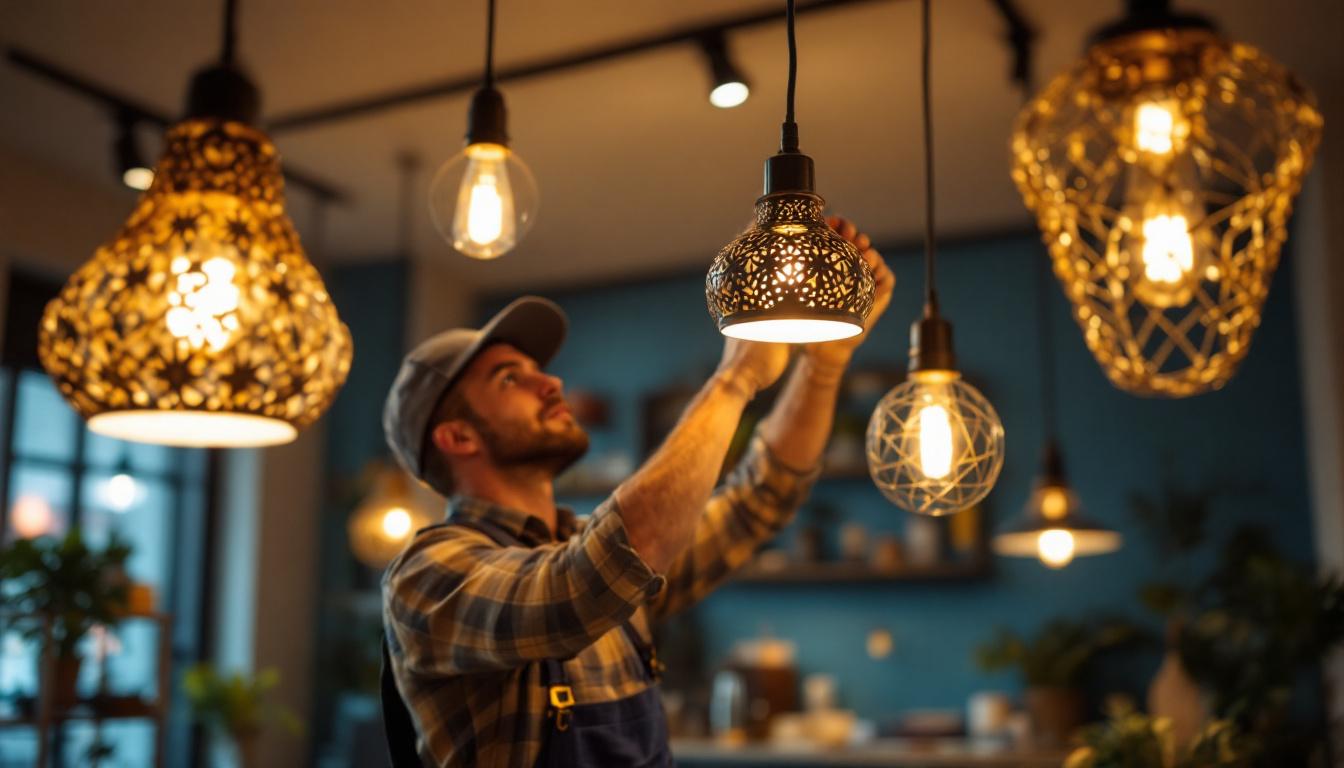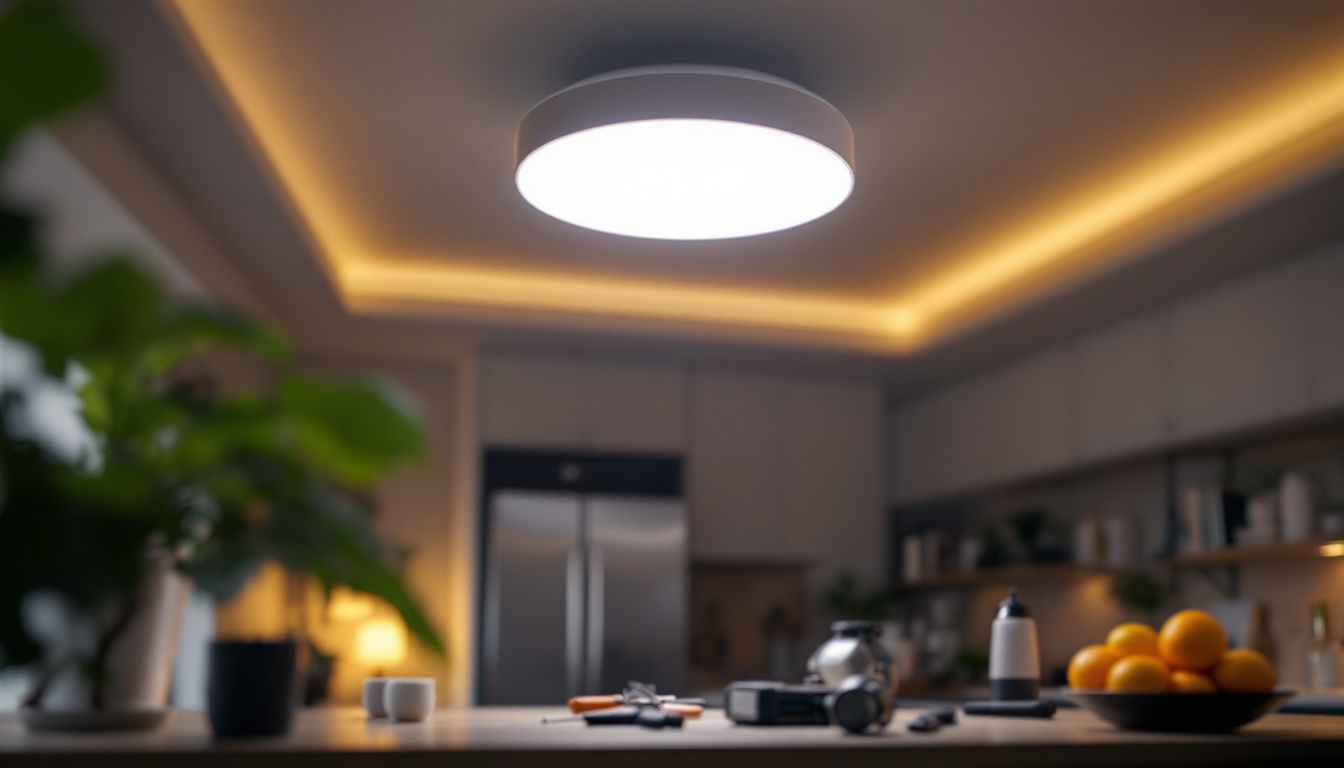
In the world of lighting design and installation, the importance of high-quality light fixtures cannot be overstated. For lighting contractors, these fixtures are not merely tools; they are essential components that can make or break a project. Understanding the significance of various light fixtures is crucial for any contractor aiming to deliver exceptional results. This article delves into the reasons why every lighting contractor needs to prioritize their selection and knowledge of light fixtures.
Light fixtures are integral to the overall aesthetic and functionality of a space. They influence not only the ambiance but also the practical aspects of lighting. A well-chosen fixture can enhance a room’s design, while a poorly selected one can detract from it.
The visual impact of light fixtures is profound. They serve as focal points that can elevate the style of a room, whether it be modern, rustic, or traditional. Lighting contractors must be adept at selecting fixtures that complement the overall design theme of the project. This requires an understanding of color, material, and scale.
Moreover, the right fixtures can create a sense of harmony within a space. For instance, a sleek, minimalist fixture can enhance a contemporary setting, while a vintage chandelier may add charm to a classic interior. The ability to match fixtures with design elements is a skill that sets successful contractors apart. Additionally, the interplay of light and shadow created by various fixtures can dramatically alter the perception of space, making rooms feel larger or cozier depending on the desired effect. This nuanced understanding of lighting dynamics is essential for creating environments that resonate with the intended mood and functionality.
Beyond aesthetics, light fixtures play a critical role in providing functional lighting. Different areas of a home or commercial space require varying types of illumination. Task lighting, ambient lighting, and accent lighting all serve distinct purposes, and choosing the right fixtures for each is essential.
For example, in a kitchen, bright task lighting is necessary for food preparation, while softer ambient lighting can create a welcoming atmosphere for dining. Understanding these requirements allows contractors to recommend and install fixtures that meet the specific needs of their clients. Furthermore, the advent of smart lighting technology has revolutionized how we approach lighting design. With the ability to control brightness, color temperature, and even the timing of lights, homeowners can customize their environments to suit their activities and moods throughout the day. This technological integration not only enhances functionality but also offers an exciting avenue for creative expression in lighting design.
There is a vast array of light fixtures available in the market, each designed for specific applications. Familiarity with these types is essential for any lighting contractor looking to provide comprehensive solutions.
Ceiling fixtures are perhaps the most common type of lighting. They come in various styles, including flush mounts, semi-flush mounts, and chandeliers. Each type serves different purposes and fits different ceiling heights and room sizes.
Flush mount fixtures are ideal for low ceilings, providing ample illumination without overwhelming the space. On the other hand, chandeliers can serve as statement pieces in larger rooms, adding elegance and sophistication. Understanding the nuances of these fixtures helps contractors make informed recommendations to their clients. Additionally, semi-flush mounts offer a middle ground, combining the benefits of both flush and hanging fixtures, making them suitable for spaces that require a bit more style without sacrificing height clearance.
Wall sconces are versatile fixtures that can enhance both lighting and decor. They are often used to create ambient lighting or to highlight specific areas, such as artwork or architectural features. Contractors should be aware of the different styles and placements of sconces to maximize their effectiveness.
For instance, sconces placed on either side of a mirror can provide flattering light for grooming tasks, while those positioned in hallways can guide guests safely through a space. The strategic use of wall sconces can significantly enhance the overall lighting design. Furthermore, sconces can be found in a variety of designs, from traditional to contemporary, allowing contractors to tailor their choices to the specific aesthetic of a home or business. Some models even come with adjustable arms or dimming capabilities, offering flexibility in how light is distributed and creating a more dynamic atmosphere.
Recessed lighting has gained popularity for its sleek, unobtrusive appearance. These fixtures are installed into the ceiling, providing a clean look while delivering effective illumination. They are particularly useful in modern designs where a minimalist aesthetic is desired.
Lighting contractors should understand the different types of recessed fixtures available, including adjustable and fixed options. Additionally, knowledge of beam angles and lumen output is crucial in ensuring that the right amount of light is delivered to the desired areas. The placement of recessed lighting can also be pivotal; for example, spacing them evenly across a room can create a uniform wash of light, while strategically placing them over work areas can enhance functionality. Moreover, with the advent of LED technology, recessed lights now offer energy efficiency and longer lifespans, making them an even more attractive option for both residential and commercial projects.
In today’s environmentally conscious market, energy efficiency is a significant concern for many clients. Lighting contractors must be equipped with knowledge about energy-efficient fixtures and technologies to meet this demand.
LED fixtures have revolutionized the lighting industry due to their energy efficiency and longevity. Unlike traditional incandescent bulbs, LEDs consume significantly less energy and have a much longer lifespan. This not only benefits the environment but also reduces costs for clients in the long run.
Contractors should be well-versed in the various LED options available, including color temperatures and dimmable features. Educating clients about the benefits of LED technology can help them make informed choices that align with their sustainability goals.
Smart lighting systems are becoming increasingly popular, offering enhanced control and convenience. These systems allow users to adjust lighting remotely, set schedules, and even change colors to suit their mood or activity. For lighting contractors, understanding smart technology is essential for staying competitive.
By incorporating smart lighting solutions into their offerings, contractors can provide clients with innovative options that enhance the functionality of their spaces. Knowledge of compatibility with various smart home systems is also crucial for seamless integration.
One of the most valuable services a lighting contractor can provide is education. Clients often have limited knowledge about lighting options and may rely heavily on their contractor’s expertise. Therefore, effective communication and consultation are key components of a successful project.
Every client has unique preferences and requirements when it comes to lighting. A thorough consultation process allows contractors to understand these needs and tailor their recommendations accordingly. This involves asking questions about the intended use of spaces, desired aesthetics, and any specific lighting challenges.
By taking the time to listen and understand, contractors can build trust and rapport with clients, leading to more successful outcomes. A personalized approach not only enhances client satisfaction but can also result in referrals and repeat business.
Visual aids can significantly enhance the decision-making process for clients. Providing samples of light fixtures or arranging demonstrations can help clients visualize how different options will look in their spaces. This hands-on approach can alleviate uncertainties and facilitate more informed choices.
Additionally, showcasing the benefits of various fixtures through real-life examples can help clients appreciate the value of investing in quality lighting. Contractors who actively engage clients in the selection process often find that it leads to more successful projects and happier customers.
The lighting industry is constantly evolving, with new technologies and design trends emerging regularly. For lighting contractors, staying informed about these changes is essential for maintaining a competitive edge.
From advancements in LED technology to the integration of smart home systems, emerging technologies are reshaping the landscape of lighting design. Contractors should make it a priority to keep abreast of these developments through industry publications, trade shows, and online resources.
Understanding the latest technologies allows contractors to offer cutting-edge solutions to their clients, ensuring that they remain relevant in a rapidly changing market. Furthermore, being knowledgeable about new products can inspire confidence in clients, reinforcing the contractor’s reputation as an expert in the field.
Design trends in lighting can shift dramatically over time, influenced by factors such as fashion, architecture, and consumer preferences. Lighting contractors should be aware of current trends to provide clients with options that reflect contemporary styles.
For instance, the rise of biophilic design, which emphasizes the connection between nature and indoor spaces, has led to an increased demand for fixtures that incorporate natural materials and organic shapes. By staying updated on these trends, contractors can better serve their clients and create spaces that resonate with modern sensibilities.
In the realm of lighting design, the importance of selecting the right light fixtures cannot be overstated. For lighting contractors, these fixtures are not just tools; they are essential elements that can enhance both the functionality and aesthetics of a space. By understanding the various types of fixtures, prioritizing energy efficiency, and staying informed about industry trends, contractors can deliver exceptional results that meet their clients’ needs.
Ultimately, the success of a lighting contractor hinges on their ability to combine technical knowledge with creative design solutions. By investing time in understanding light fixtures and their applications, contractors can elevate their work and ensure that their projects shine brightly.
Ready to elevate your lighting projects with fixtures that blend aesthetic appeal, functionality, and energy efficiency? Look no further than LumenWholesale, where we provide contractors with an extensive selection of top-quality, spec-grade lighting products at unbeatable wholesale prices. Say goodbye to local distributor markups and hello to superior lighting solutions that meet the highest industry standards. With free shipping on bulk orders, you can stock up on premium lighting without hidden fees or compromises. Make your next project shine with the perfect blend of quality, affordability, and convenience at LumenWholesale – Wholesale Lighting at the Best Value.
Discover the reasons behind flickering light bulbs and learn how addressing this common issue can enhance your lighting business.

Explore how unique pendant lighting is revolutionizing the lighting industry, offering contractors innovative design solutions and transforming spaces with style and efficiency.

Discover how LED strip lights can revolutionize warehouse lighting with energy efficiency and cost savings.

Discover the essential checklist for lighting contractors when installing LED ceiling light fixtures.